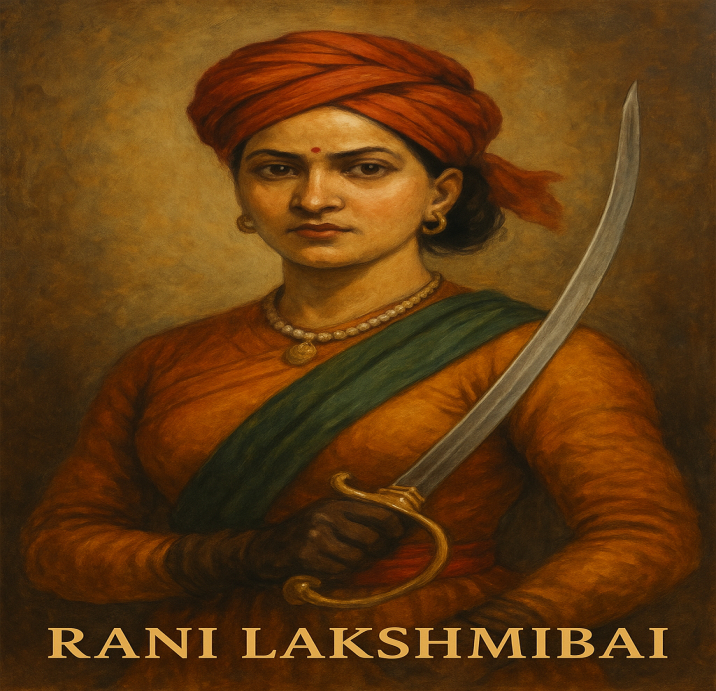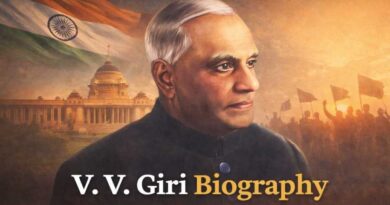Rani Lakshmibai Biography – Life, Struggles & Legacy of the Warrior Queen, Full details 2025 updated
Rani Lakshmibai Biography – Life, Struggles & Legacy of the Warrior Queen
Rani Lakshmibai Biography – The Fearless Queen of Jhansi
Rani Lakshmibai, the brave Queen of Jhansi, is remembered as one of the most powerful and inspiring women in India’s history. Known for her unmatched courage and leadership during the First War of Indian Independence in 1857, she became a symbol of resistance against British rule and a beacon of hope for future generations.
Table of Contents
Early Life: From Manikarnika to Lakshmibai
She was born as Manikarnika Tambe on 19 November 1828 in Varanasi and was affectionately known as ‘Manu.’ Her father, Moropant Tambe, served in the court of the Peshwa in Bithoor, where Manu grew up learning horse riding, swordsmanship, and archery alongside boys, a rarity for girls in her time.
Her mother passed away when she was young, but her strong upbringing by her father and guidance under the Peshwa gave her an unconventional childhood, one that would shape her destiny.
At the age of 14, she was married to Maharaja Gangadhar Rao, the ruler of Jhansi, and was renamed Lakshmibai. After the tragic death of their son, they adopted a boy named Damodar Rao. However, following the Maharaja’s death in 1853, the British East India Company refused to recognize the adopted heir and sought to annex Jhansi under the Doctrine of Lapse.
The Rebellion of 1857: Rani Lakshmibai Rises
When the 1857 Revolt broke out, Rani Lakshmibai emerged as a central figure. Initially, she tried to negotiate with the British for her kingdom’s rights. But after being betrayed and attacked, she decided to fight.
With sheer determination, she organized a resistance army, comprising both men and women. Her forces fiercely defended Jhansi against a British siege led by Sir Hugh Rose in 1858. Although vastly outnumbered, Lakshmibai’s leadership stunned the British.
When the fort was breached, she escaped with Damodar Rao and continued fighting from Kalpi and later Gwalior, rallying other rebel leaders like Tatya Tope and Nana Sahib.
5 life lessons from Rani Lakshmibai
1. Courage Has No Gender
“Main apni Jhansi nahi doongi.”
Rani Lakshmibai proved that bravery is not limited to men. She fought on horseback, sword in hand, even with her child tied to her back. Her life shows that strength and leadership are defined by character, not gender.
2. Stand for Your Rights
She refused to accept the British annexation of her kingdom under the Doctrine of Lapse. Her resistance teaches us to fight for justice, dignity, and our rightful place, no matter how powerful the opposition.
3. Never Give Up
Even when surrounded by enemies, betrayed, and outnumbered, she did not surrender. Her story is a timeless reminder:
“Defeat is not falling down, but refusing to rise again.”
4. Responsibility Over Comfort
As a queen, mother, and warrior, she prioritized her duties to her people and country over personal comfort or safety. Her example inspires us to put purpose above pleasure.
5. Inspire Through Action
Lakshmibai didn’t just give speeches, she led from the front, sword in hand and courage in heart. Her life teaches that real leadership is action-based, and true inspiration comes when we live our values boldly.
The Final Battle & Martyrdom
On 17 June 1858, at the young age of 29, Rani Lakshmibai was martyred in the battlefield of Gwalior while fighting against the British. Dressed as a soldier, she fought valiantly to the last breath.
Her body was reportedly cremated by a loyal attendant to prevent British forces from dishonoring her remains. Her death marked a turning point—though the rebellion was suppressed, her sacrifice ignited a flame that would fuel India’s freedom struggle for decades.
Legacy of the Warrior Queen
Rani Lakshmibai’s life is a testament to patriotism, courage, and women’s empowerment. She has been immortalized in folk songs, poems, and textbooks. The famous Hindi poet Subhadra Kumari Chauhan wrote:
“Khoob ladi mardani, woh to Jhansi wali Rani thi.”
(She fought valiantly like a man, she was the Queen of Jhansi.)
From grand statues to roles in movies and books, Rani Lakshmibai is still celebrated all over India as a symbol of courage and pride, roads, and awards have been named after her, and she continues to inspire countless women to rise above limitations and fight for justice.
Final Thoughts
Rani Lakshmibai was not just a queen; she was a revolutionary spirit far ahead of her time. In a patriarchal world, she rose to command armies, challenge imperial powers, and die for her people. Her legacy endures—not just in history books but in the hearts of millions.
Read more Biography
![]()




